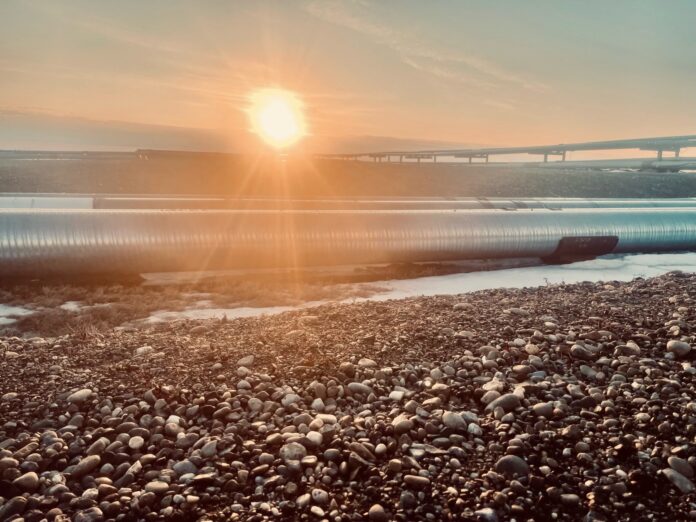By THOMAS PYLE | AMERICAN ENERGY ALLIANCE
On his campaign website in March 2024, Sen. Rob Yundt wrote, “Alaska stands at a critical juncture in its economic trajectory.” He was right then, and his statement is true now – Alaska is at a crossroads. Despite the unfriendly policies of the Biden administration, Alaska’s oil and gas industry is finally regaining momentum as the Trump administration reduces restrictions on production.
For example, President Donald Trump is actively promoting Alaskan U.S. liquefied natural gas (LNG), aiming to enhance U.S. energy dominance and strengthen economic ties with East Asian allies. In a recent meeting with Japanese Prime Minister Shigeru Ishiba, the president proposed Japan’s participation in a $44 billion Alaska LNG project.
Unfortunately, Senate Bill 92 threatens to derail this progress by imposing hundreds of millions in new taxes on production in Prudhoe Bay.
Senator Yundt’s proposed tax increase couldn’t come at a worse time. When major oil companies were reducing their Alaska investments due to changing market conditions and pressure from environmental organizations with clear anti-fossil fuel agendas, privately-owned Hilcorp stepped up to invest in the Last Frontier. Their acquisition of BP’s assets ensured the continued operation of critical energy infrastructure, preserved Alaskan jobs, anddemonstrated a long-term commitment to the state when others were pulling back.
Investment from privately-held oil and gas companies, like Hillcorp, means they aren’t beholden to shareholder demands; rather they can make long-term investment decisions. Alaska needs a stable tax structure to attract investment from oil and gas companies, no matter their corporate structure. SB 92 would fundamentally undermine this stability. The hundreds of millions in new taxes represent real money that would otherwise be reinvested in Alaska’s infrastructure, workforce, and communities. Instead of allowing these resources to directly support economic growth, politicians in Juneau would redirect these funds according to their priorities.
The impact of this tax will also be felt by the broader oil and gas industry, including direct jobs, contractors who depend on oil and gas projects, and countless small businesses that service these operations. The ripple effects would touch communities throughout Alaska.
Ironically enough, less than a year ago, Senator Yundt warned that “history teaches us that over taxing residents often yields unintended consequences like stifling economic growth & burdening residents.” He advocated for “nurturing economic expansion through responsible resource development” and “reducing the many bureaucratic hurdles slowing private enterprises.” Senator Yundt alsowrote that, “imposing additional taxes would infringe upon these liberties” and “represent a governmental overreach that contradicts Alaska’s ethos of independence & self-reliance.”
What changed? Why is Senator Yundt now trying to pass a tax increase that would cost hundreds of millions of dollars?
Alaska needs high-density, reliable energy that’s available year-round. Thanks to President Trump, the state also has an enormous opportunity to export its energy around the world. It needs elected officials who understand that unnecessary constraints on resource development only undermine our long-term fiscal health—officials who stand by their campaign promises rather than reversing course once in office.
Senator Yundt was right when he stated that Alaska should focus on “reducing or at the very least capping state spending while at the same time nurturing economic expansion through responsible resource development.” He was right when he noted that “streamlining regulations and reducing bureaucratic red tape are imperative” because “excessive regulations stifle entrepreneurship and deter investment.”
But he couldn’t be more wrong now, with legislation that would increase tax burdens, create economic uncertainty, and deter future investment in the state.
Thomas Pyle is the President of the American Energy Alliance.

Yundt’s not very bright
Thank you, Thomas! Very well said. Praying this message gains momentum and changes minds in the legislature.
Costs of Production are passed on to consumers. Simple business fact. If the production of Oil and Gas on the Slope goes up so does the cost at the pump. Who pays the Tax ???
Alaska doesn’t have any values at all.
Comments are closed.